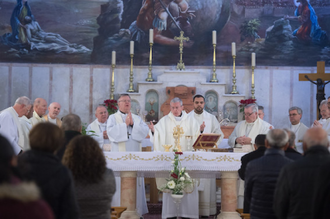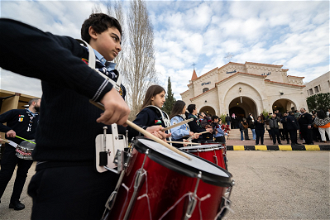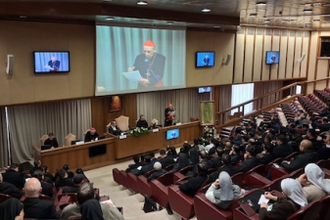Bishops insist on application of international law in Holy Land

Mass at Latin Patriarchate School, Ramallah
Source: CCN
Bishops from across Europe and North America have called on their governments today, to insist on the application of international law in Israel and Palestine, following their visit to the Holy Land this week.
The bishops of the Holy Land Coordination, who visit the region every year in support of the local Church to promote dialogue and peace, said they were inspired by the enduring resilience of the people they met in Gaza, East Jerusalem and Ramallah despite the worsening situation.
However, they echoed the local bishops' lament the international community's failure to realise justice and peace in the land of Christ's birth. While the political solution had ultimately to be shaped by the people of the Holy Land through dialogue, they said there was an urgent need for the governments in their own countries in Europe, Canada and the USA to play an essential part by:
Insisting on the application of international law; following the Holy See's lead in recognising the State of Palestine; addressing the security concerns of Israel and the right of all to live in safety; rejecting political or economic support for settlements and resolutely opposing acts of violence or abuses of human rights by any side.
They concluded their communique with prayer for the peace of Jerusalem.
Read the full text of the Bishops' statement below:
Holy Land Coordination 2020
We must not ignore the voice of people in the Holy Land
Every year we come to encounter and hear the people of the Holy Land. We are inspired by their enduring resilience and faith in a worsening situation.
In their recent powerful message, the local Catholic Bishops lamented the international community's failure to help realise justice and peace here in the place of Christ's birth.[1] Our governments must do more to meet their responsibilities for upholding international law and protecting human dignity. In some cases they have become actively complicit in the evils of conflict and occupation.
The local Bishops also warned that people are facing further "evaporation of hope for a durable solution." We have witnessed this reality first-hand, particularly how construction of settlements and the separation wall is destroying any prospect of two states existing in peace.
In the same message, the local Bishops have sounded the alarm about living conditions becoming "more and more unbearable". This is painfully clear in the West Bank where our sisters and brothers are denied even basic rights including freedom of movement. In Gaza the political decisions of all sides have resulted in the creation of an open air prison, human rights abuses and a profound humanitarian crisis. We were welcomed by families whose focus is now day-to-day survival and whose aspirations have been reduced to bare essentials such as electricity and clean water.
Amid these circumstances we are moved by the sacrifice of religious sisters, lay people and priests who are reaching out with respect to every side, in order to build a better future for all. They offer vital services, especially education, job opportunities and care for the most vulnerable people. We give thanks for their witness.
We encourage Christians in our own countries to pray for and support this mission. The increase in people making pilgrimages to the Holy Land is encouraging and we call for those who come to ensure they encounter the local communities.
At the same time we implore our governments to help build a new political solution rooted in human dignity for all. While this must ultimately be shaped by the peoples of the Holy Land in dialogue, there is an urgent need for our countries to play their part by:
Insisting upon the application of international law;
Following the Holy See's lead in recognising the State of Palestine;
Addressing the security concerns of Israel and the right of all to live in safety;
Rejecting political or economic support for settlements;
And resolutely opposing acts of violence or abuses of human rights by any side.
In taking these steps the international community can meaningfully stand in solidarity with those Israelis and Palestinians who are refusing to give up their non-violent struggle for justice, peace and human rights.
We pray for the peace of Jerusalem.
Bishop Declan Lang (Chair of the Holy Land Coordination)
England and Wales
Bishop Udo Bentz
Germany
Archbishop Timothy Broglio
United States of America
Bishop Peter Bürcher
Denmark, Finland, Iceland, Norway and Sweden
Bishop Rodolfo Cetoloni
Italy
Bishop Christopher Chessun
Church of England
Archbishop Richard Gagnon
Canada
Bishop William Kenney
England and Wales
Bishop Alan McGuckian
Ireland
Bishop William Nolan
Scotland
Bishop Marc Stenger
France
Bishop Noel Treanor
Ireland
Archbishop Joan Enric Vives Sicilia
Spain
Fr Antonio Ammirati
Council of Bishops' Conferences of Europe
Dr Erwin Tanner
Switzerland
THE HOLY LAND COORDINATION
The Holy Land Co-ordination, made up of bishops from across Europe, North America and South Africa, was established 20 years ago at the invitation of the Holy See with the aim of visiting and supporting the Holy Land's local Christian communities.
The Co-ordination's raison d'être can be expressed through the "3 Ps": Prayer, Pilgrimage, Persuasion.
Prayer is the framework within which the annual meeting takes place, with the daily celebration of the Eucharist, often in different Rites and with the local Catholic communities.
Pilgrimage: The bishops go individually or in groups to visit the Catholic communities, meeting their members and at times local political figures, too. In difficult times, the visiting bishops have often listened to requests for a greater presence of pilgrims, and there has been a concerted and successful effort on the part of the Bishops' Conferences to encourage pilgrimages to the Holy Land.
Persuasion refers to the work undertaken after the annual meeting, when the bishops return home and speak to their own Governments, Members of Parliament, Israeli and Palestinian Ambassadors and to the media about a vast range of questions concerning the lives of Christians. In line with the approach adopted by the Holy See elsewhere, the bishops do not seek privileges for Christians, but dignity and justice for them and for others who live in similar conflict situations.
Perhaps there should be a fourth P: Presence. The bishops come every year, and by their presence they hope to remind the Christian communities in the Holy Land that they are not forgotten by their brothers and sisters in other parts of the world.


















